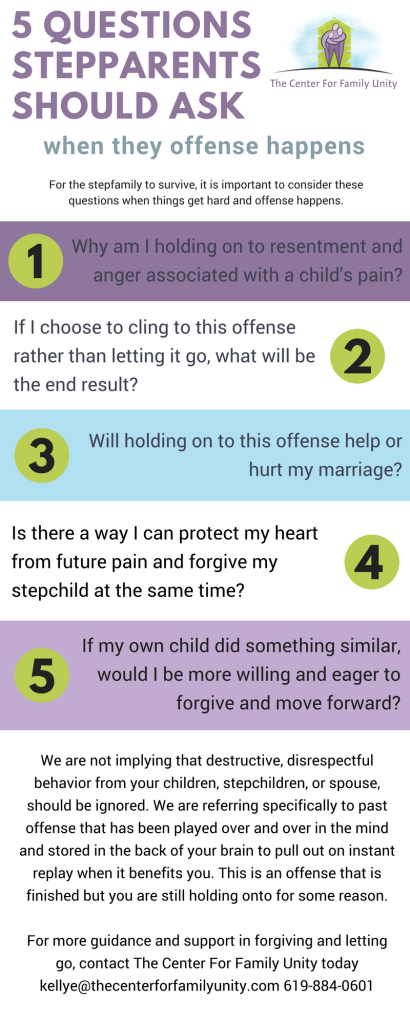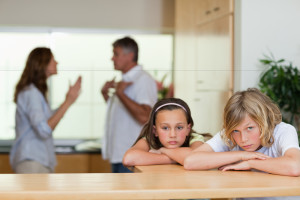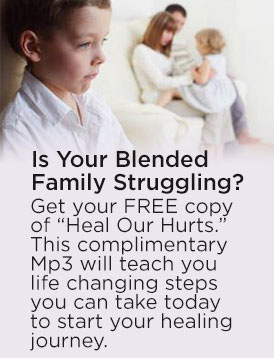by admin | Jun 25, 2017 | Uncategorized

5 Questions Stepparents Should Ask When Offense Happens
For the stepfamily to survive, it is important to consider these questions when things get hard and offense happens.
- Why am I holding on to resentment and anger associated with a child’s pain?
- If I choose to cling to this offense rather than letting it go, what will be the end result?
- Will holding on to this offense help or hurt my marriage?
- Is there a way I can protect my heart from future pain and forgive my stepchild at the same time?
- If my own child did something similar, would I be more willing and eager to forgive and move forward?
We are not implying that destructive, disrespectful behavior from your children, stepchildren, or spouse, should be ignored. We are referring specifically to past offense that has been played over and over in the mind and stored in the back of your brain to pull out on instant replay when it benefits you. This is an offense that is finished but you are still holding onto for some reason.
For more guidance and support in forgiving and letting go, contact The Center For Family Unity today [email protected] 619-884-0601
by admin | Mar 29, 2017 | Uncategorized
Fill in the blank: Kids who experience conflict in the home are more likely to…
In today’s world, parents struggle to keep their children safe from psychological harm. We often wish that we could control the books they read, the music they listen to, and the TV shows they watch, solely because we fear the negative influence that media can have on their development. But surprisingly, many parents overlook one of the most important factors in their child’s psychological well-being. They don’t see themselves and their relationships as external influences on children. In truth, children who experience parental conflict are often at a higher risk for a number of psychological and behavioral problems.
This is especially the case when it comes to couples who clash in parenting style. Research from Baylor College of Medicine in Houston, by Dr. James H. Bray, shows that behavioral problems are more likely to occur in children whose parents have differing opinions on parenting style. For example, if one parent is very strict and the other lets the kids do anything they want, it can lead to disagreements as well as confusion on the part of the children. But even when disagreements aren’t over parenting issues, excessive parental conflict still hurts children.
According to Rabbi Yisroel Roll, a licensed child psychotherapist, there are three main negative responses that children have towards parental conflict: First, the child’s emotional security may plummet. “A child needs emotional safety and security in order to thrive academically and socially,” he says. “The environment in the home between the parents creates that sense of security. That’s the child’s world. When there is conflict, argument, [and] tension between the parents, that basically shatters the secure safety net of the children.”
Secondly, children may blame themselves for the conflict. In a child’s mind, the world revolves around their actions. When they hear their parents arguing, they may be convinced that it is their fault even if it has nothing at all to do with them. When the conflict does revolve around discipline issues, the child can feel even guiltier.

The third possible response that children might have to parental conflict is to act out.
Rabbi Roll maintains that if a parent wants a misbehaving or unmotivated child to come to a therapy session, he must see the child and parents together for a family session first. “The child is often reacting to what’s going on between the parents,” says Rabbi Roll. “And sometimes, this may sound shocking, but children act up on purpose in order to get their parents to get their act together. They know psychologically that the parents are not on the same page, and they want to force their parents to try to deal with them. Once you see better parental communication, more observable warmth, respect and love between the parents, the children simply calm down.”
Surprisingly, there’s actually an advantage to all this. Rabbi Roll explains that unless people are extremely motivated towards self-growth, the only real way to strengthen a marriage is through conflict resolution. “Conflict is an opportunity for a couple to work on themselves, as a couple and as individuals…Too much conflict incapacitates the marriage, but a little bit of conflict is a good thing. A little bit of anxiety is a good thing; a little bit of guilt is a good thing too. Conflict is a message from within the marriage to improve communication and to get their act together.”
In addition, it’s healthy for children to watch parents communicate with each other to settle an argument, assuming that it’s done in a caring and effective way.
Any of these behaviors sound familiar?
Here are some steps you can take to reduce disagreements with your partner:
- Compromise whenever the issue does not revolve around an issue that you feel is absolutely nonnegotiable, like safety. This doesn’t make you a pushover; it just means that you’re willing to pick your battles and avoid a constant war zone. Visit a marital counselor to try to work things out.
- Attend a parenting class together with your spouse, especially if the conflict is related to differing parenting styles.
- Communicate using “I” messages. Instead of using the word “you,” such as “You messed up,” or “You make me feel so upset,” begin with “I”: “I am feeling frustrated. I don’t like it when you…”
- Keep your disagreements away from the kids. If you must disagree, realize that doing so in front of the children almost guarantees that the situation will generate some of the negative repercussions discussed in this article.
If you need help and support with high conflict parenting or parent/child reconciliation, please DON’T WAIT, call today to The Center for Family Unity 619-884-0601
by admin | Feb 1, 2017 | Uncategorized
Do you find yourself consistently feeling unfulfilled in your step family relationships or not asserting yourself enough? Perhaps you have difficulty figuring out where your responsibility for someone else ends? Issues like these and others, such as perfectionism, low self-esteem, distrust, and even physical illness related to stress can indicate that you have some codependent behavior.
Codependency commonly occurs when a loved one needs support because of an addiction or an illness and we take care of that person at the expense of ourselves. In a step family the desire to have a successful, harmonious second or third family can push us to the point of sacrificing our own needs in an attempt to create a happy home. Codependents can also attempt to control everything within a relationship, again, without addressing their own needs, setting themselves up for unfulfilling interactions and even sometimes unintentionally discouraging the loved one from seeking outside help.
We learn codependency by watching and imitating people in our family and in society who display the behavior. Often, codependency passed down from generation to generation.
Not everyone is codependent but many of us have been taught codependent behaviors, such as not being assertive, or we simply don’t know how to directly ask for our needs to be met. Women are sometimes taught that codependent behavior is how all women should behave.

Since codependency is a learned emotional and behavioral condition, that means it can also be unlearned. Here are some ways to begin:
- Recognize where it comes from. Many things we were taught as children set us up to become codependent. For example, sayings like: “Don’t rock the boat” teach us to be passive and keep the peace at all costs.
- Begin to understand where the boundary is between yourself and other people. Although this can be confusing for the codependent at first, when you start to realize that you are not responsible for your partner’s depression or anger, for example, it will become an easier concept to grasp. Learning what is your responsibility as the step-parent as well as having open dialogue with your spouse about the challenges in the household will help release you from undue stress and compromising your health. You have to take care of yourself first. Remember the air travel admonition to put on your own oxygen mask before helping others with theirs? You can’t truly help someone else until you’ve taken care of your own needs.
- Learn when and how to say ‘no.’ As you become more self-reliant, you will have to learn to say ‘no.’ That can be challenging, but understand that your ‘no’ is usually expressed anyway, often through resentment. It’s empowering to say ‘no’ when you want to. You’ll also find that standing up for your needs and expressing yourself more frequently will improve your well-being and even your relationships.
The cycle of codependency can be broken as you find freedom and self-esteem in the process of recovering your own voice and expressing it. In time and with practice, you won’t worry so much about what others think of you, and you won’t feel the need to control others or their response to you. Healing is possible, and it can start today.
You’ll find that it’s okay to talk openly about problems; you won’t worry so much about others and you won’t feel the need to keep feelings to yourself. At The Center for Family Unity, we specialize in helping Step families create the relational success and harmony they desire.
To learn more about our process, download our FREE e-book, A Good Blend: Seven Steps To Blended Family Success, now!
Book your free 20 minute phone consultation to learn how we can help you in the process of creating a healthy, happy home. BOOK NOW
by admin | Jan 12, 2017 | Uncategorized
At the Center for family unity we work with you to change your life, your perspective, and your families. Here are 17 habits that you need to stop if you want to change your life in 2017
1. Stop checking social media during the workday.
Social Media platforms are masters at making you stay there. Getting lost in Facebook can be fun, but it’s counterproductive during the day — especially while you’re trying to build that presentation for your investors. And while we’re on the subject, turn off the notifications on your phone too. You can check your Snaps on your break.
2. Stop thinking it’s all about you.
Your frowning boss isn’t conspiring to fire you, as much as the cashier isn’t giggling about your tie. They’re thinking about themselves, and their own problems. Not you. I promise. It’s not about you. So cut it out. Run on that assumption when dealing with every human interaction in your life, and you’ll be much happier.
3. Stop doing so much multi-tasking.
Science tells us that only 2% of us can really multi-task. So don’t try. Try this instead: When attempting to get something off your “to-do” list, shut down every browser and app on your screen except for the one you need. Otherwise, you’ll get notifications for everything from LinkedIn requests to Facebook Live posts to Tweets. A never-ending stream of distraction. So shut down everything except the program you need, and finally get things done.
4. Stop comparing yourself to everyone.
You will never win this game. There will always be someone smarter, better looking, richer and (seemingly) happier. Always. Focus on yourself, your mindset, your health, the state of your being, and you’ll win.
5. Stop complaining.
It’s just not worth it. Be aware of the words that come out of your mouth. They affect you and the people around you. Speak of good things, and more good things happen. Speak of negative things, and more negative things happen. Simple.
6. Stop wasting time with negative people.
If they don’t love and support you, get rid of them. You don’t have to shout, kick and scream. Just stop being available to them. They won’t notice. They’re too self-centered to care.
7. Stop taking or organizing long and unnecessary meetings.
Less meeting means more doing. We’re all adults. Take the meeting, do what you need to do, and go and do it. You can be social and have fun while still succeeding at making meetings more efficient.
Try this in your next meeting. Set an agenda. As you run through the agenda go around the room and have everyone share:
- What they’re working on
- What they’ve completed
- What they need to complete
- What they’re still working on
It works, I promise. You’ll shave a 1/2 hour off your meeting, every time.
8. Stop saying “yes.”
You may think you don’t have enough time. You do. You just spend your time doing the wrong things.
Stop saying “yes” to everything. Embrace “no.” Love “no.” No is your word for 2017. Love it, live it, and use it.
9. Stop self-loathing thoughts & beliefs.
Enough is enough. You are good at what you do. You have it in you. If you can’t silence that voice in your head, begin a regiment of meditation. If you need some quick wins to feel good about yourself, write three things you want to change this year. Right now. Go ahead, I’ll wait.

Congratulations, you took the first step. Feel that little endorphin release in your brain? That’s what you’re looking for. Keep doing that, and you’ll break that habit and create a new one. A habit where you actually get things done. Now go do things!
10. Stop sitting.
Get off your backside. Run, exercise, move. But stop sitting. Oh, and get a standing desk while you’re at it.
11. Stop underachieving.
You’re better than this. You have more in you, and you’re not getting any younger. Start that business. Resign from that horrible job. Do it now. The only thing stopping you is you. Not your family, not your bank account. Just you. Get out of your own way and go for it!
12. Stop bragging about your resolutions before they happen.
Your brain thinks you’ve accomplished them when you announce them to the world. Stop that. This TED talk helps to explain the phenomenon.
13. Stop creating excuses.
While you’re at it, stop creating “reasons” too. They’re just excuses with lipstick on.
14. Stop investing time in reality TV, celebrity gossip, etc.
You’re an adult; this shouldn’t be a part of your entertainment. It’s junk food for your brain. It feels great at first, but there is always a negative mental consequence.
15. Stop obsessing over dooms-day scenarios.
It’s good to have some healthy skepticism, but pessimists don’t change the world, motivate people, or come up with innovative ideas. They only bring the people around them down.
16. Stop obsessing over things outside of your control.
Focus your time, energy and resources on improving yourself. You can control everything you put in your body, think about and do. Master yourself and become ruler of your universe.
17. Stop convincing yourself that everything has to be perfect.
It ain’t happening. Ever. This is just a complicated form of procrastination which is really just a manifestation of deep-rooted fear. Get out of your own way, and let the little things go so you can focus on what really matters.
For help with implementing these changes your own private counselor/coach is available to meet with you in person and via Skype. Call 619-884-0601 today to make your appointment
by admin | Dec 13, 2016 | Uncategorized
I am a marriage and family therapist, play therapist and founder of The Center for Family Unity. I have studied alternative methods to help our children focus, calm down and combat illness. Personally and professionally, I suggest using doTERRA products to support a healthy lifestyle. Perhaps you’re a little nervous to use oils on your kids; maybe you’re not sure if they’re entirely safe for the younger set. I can help you learn how to parent using a combination of behavioral techniques and doTERRA products. We enjoy them daily in our house and at our Center. If these products are used with care and common sense, you can safely reap all the benefits they have to offer.
If you are nervous about using essential oils on the younger set, here are some things to keep in mind:
1. Essential oils are not novel. While it may seem like essential oils are just the latest and greatest thing, they’ve actually been used by humans for millennia. Essential oils contain constituents that will be recognized by our body systems and handled appropriately. Rest assured that if you use essential oils on your children, you’re not inventing the wheel.
2. Kids are not tiny adults. Remember that oils are potent, and you only need a very small amount to achieve efficacy, especially when it comes to children. A little bit goes a very long way. Adjust amounts accordingly.
3. Dilute. Kids’ skin is different from adult skin; it’s thinner and generally more sensitive. Even though most oils tend to be non-irritating on the skin (especially on the bottom of the feet, where the skin is thickest), it’s a great idea to dilute essential oil in a good carrier oil before applying to children. You’ll still get the same benefits of the essential oil—you’re just adding extra moisture and pampering delicate child skin. The doTERRA Touch products are great for this, by the way. They’re our favorites!
4. Diffuse. Aromatherapy is an excellent way to enjoy the benefits of essential oil without the worry of skin reactions. Inhaled oils have long been studied for their ability to enhance feelings of relaxation, encouragement, excitement, focus, and well-being. Additionally, diffused oils may support a healthier indoor environment. That’s always a bonus when you’ve got a houseful of kids.
5. Oils FOR kids, not BY kids. The labels on doTERRA’s oil bottles remind us to keep them out of reach of children. Kids won’t understand the potency of the essential oils—they only know that these lovely liquids smell divine, and may go overboard in using them. Adults, not children, should always be doing the oil applications, and judiciously at that.
6. Be informed. doTERRA has mountains of information about safe usage of essential oils on their websites. There’s an entire team of support staff who answer questions about essential oils and products (just email [email protected]). And don’t be afraid to chat about oil usage with your family doctor or pediatrician—medical professionals like having a holistic picture of their patients’ health situation, and they have access to other medical literature that can help guide your decisions.
Not sure where to start? Here are some of the favorite doTERRA products in our house, and ways they can be used with children.
1. doTERRA Touch™. These products are awesome because they come pre-diluted. Young skin is different from adult skin—it’s thinner, more delicate, and generally more sensitive. It’s a great idea to dilute any essential oils before applying them to children, and this kit takes the mess out of dilution.
2. doTERRA OnGuard® products. We love all the products containing doTERRA OnGuard, and they are very kid-friendly. The toothpaste is wonderful. My kids enjoy the taste and I enjoy that it’s not full of chemicals that even I can’t pronounce. The cleaner concentrate makes the bathroom fresh and I don’t have to worry about toxic residue. And, of course, we diffuse doTERRA OnGuard like crazy during the winter months.
3. doTERRA Balance® and doTERRA Serenity®. These blends have done wonders for our family. We recently moved, and my kids were having trouble sleeping in their new rooms. A nice massage with these oils (diluted and applied to soles of feet) helped everyone feel relaxed and grounded in the new surroundings. We often return to these blends when the stresses of life have everyone worked up.

essential oils and medical flowers herbs
4. Citrus oils. We diffuse oils every day, and the citrus oils are my kids’ favorite. They are so uplifting and energizing—perfect for the dreary winter days when no one feels like rolling out of bed. It’s a natural way to chase off the post-holiday blues. Our favorites are Wild Orange, Lemon, and Grapefruit. We even apply the oils to the palms of our hands and cup them to our noses for an easy “scent tent.” (Just be sure to avoid sun exposure after applying citrus oils topically!)
5. Correct-X®. We always have this product on hand during our outdoor adventures; it’s great to have something natural and effective, yet gentle and non-irritating, for sensitive young skin.
Yes, we live doTERRA in my house and at the Center. It’s fun to see my patients, my children and grandchildren starting to understand which oils might be good in various situations and asking for them as needed. They’re learning to be cognizant of their own health while actively looking for natural ways to support well-being. I love it!
We can help you discover the magic of power and knowledge assisting you in raising your children in the best possible way.
Visit: www.TheCenterforFamilyUnity.com call: Kellye Laughery, director at 619-884-0601
Or email [email protected] for support on your family journey to freedom













